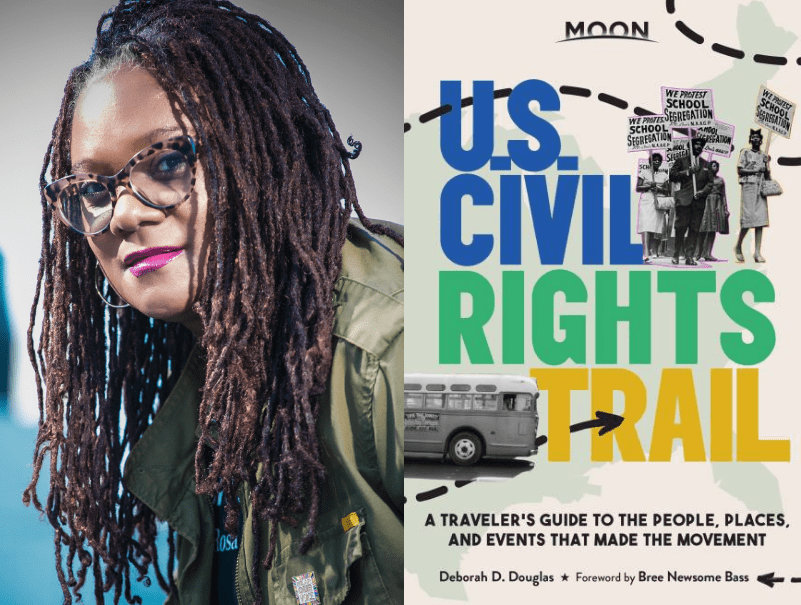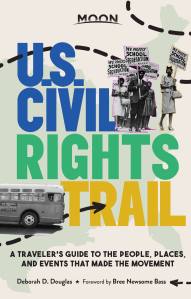Deborah D. Douglas

Deborah D. Douglas is an award-winning journalist, cultural critic, and thought leader specializing in the African American lived experience. Her work has been cited by the New York Times, and she’s won numerous awards for her writing for Oprah magazine and other outlets.
Moon U.S. Civil Rights Trail offers a vivid glimpse into the story of Black America’s fight for freedom and equality. From eye-opening landmarks to celebrations of triumph over adversity, experience a tangible piece of history with Moon U.S. Civil Rights Trail.
Buy the Book.
 Delicious, determined, destinations.
Delicious, determined, destinations.
 Currently, downtown Chicago. But to suggest I wrote this book surrounded by books, beauty and ergonomically correct furniture would be a fantasy. I wrote wherever I could. My apartment ceiling on campus outside Indianapolis fell in last year, and my office temperature controls at DePauw University where I teach ran amuck. I took over the breakroom, I wrote at Starbucks, I wrote hunched over in my bedroom, the one room that was habitable during my collapsed-ceiling phase. When the pandemic kicked off and school shuttered, I moved to Michigan and hunkered down in my mother’s open living room, surrounded by papers, a printer, books, collateral materials, you name it. I am now in a loft apartment in downtown Chicago with a decent view, as if all that craziness never happened. Go figure.
Currently, downtown Chicago. But to suggest I wrote this book surrounded by books, beauty and ergonomically correct furniture would be a fantasy. I wrote wherever I could. My apartment ceiling on campus outside Indianapolis fell in last year, and my office temperature controls at DePauw University where I teach ran amuck. I took over the breakroom, I wrote at Starbucks, I wrote hunched over in my bedroom, the one room that was habitable during my collapsed-ceiling phase. When the pandemic kicked off and school shuttered, I moved to Michigan and hunkered down in my mother’s open living room, surrounded by papers, a printer, books, collateral materials, you name it. I am now in a loft apartment in downtown Chicago with a decent view, as if all that craziness never happened. Go figure.
 I write because as a child, I could not always speak, so I made a promise to observe so one day I could write and say — EVERYTHING.
I write because as a child, I could not always speak, so I made a promise to observe so one day I could write and say — EVERYTHING.
Moreover, the story my book tells is the backstory to how I became a child of the Great Migration growing up in a white flight community where my Black neighbors had a connection to the South. Both my divorced parents were children of sharecroppers, so really, anything we do is a miracle as far as I’m concerned. The civil rights story explains the economic destabilization I watched unravel growing up in ‘70s Detroit and the wonder of my father’s business on the West Side of Chicago. As a child, I didn’t fully realize the roles that of racial terror in the South or that the lack of economic opportunity played in my being born in Chicago and raised in Detroit. I moved South in junior high to live with my grandmother. What the civil rights movement started was still being implemented when I was a student.
In a small town outside of Memphis, I felt the pangs of racial unease in a school system that worked to keep us segregated inside the walls of our so-called integrated school. It takes a lot to show up to class every day with white teachers who, on their best day, are rooting for you to be mediocre or the type of Black person who can go through life taking instructions as your sole function in society. The South also grounded me in a better notion of family, tribe, and my responsibility to it because the other institution outside of school that loomed large was my church. It was largely responsible for my social programming and sense of mission, in addition to my radical Black and Jewish teachers in Detroit.
 Well, that would be Maya Angelou. I crashed Alex Haley’s funeral so I could meet her, but something came up in her travel plans. (I’m a little jealous of Oprah for her relationship with Maya.) It was not at all weird to crash the funeral because that church was a part of my childhood, and Alex is said to be a distant cousin.
Well, that would be Maya Angelou. I crashed Alex Haley’s funeral so I could meet her, but something came up in her travel plans. (I’m a little jealous of Oprah for her relationship with Maya.) It was not at all weird to crash the funeral because that church was a part of my childhood, and Alex is said to be a distant cousin.
 “Chicken Little” was my all-time favorite. Maybe that’s why I became a journalist, alerting people to what’s coming. Everything Maya Angelou wrote and poetry by Langston Hughes. In Tennessee, my across-the-street neighbors, the Taylors, had a home library full of books from when they attended historically Black colleges and universities. I found books that resonated with my lived experience there.
“Chicken Little” was my all-time favorite. Maybe that’s why I became a journalist, alerting people to what’s coming. Everything Maya Angelou wrote and poetry by Langston Hughes. In Tennessee, my across-the-street neighbors, the Taylors, had a home library full of books from when they attended historically Black colleges and universities. I found books that resonated with my lived experience there.- Flexible Itineraries: Travel the entire trail through the South, or take a weekend getaway to Charleston, Birmingham, Jackson, Memphis, Washington DC, and more places significant to the Civil Rights Movement
- Historic Civil Rights Sites: Learn about Dr. King's legacy at the Lorraine Motel in Memphis, be transformed at the small but mighty Emmett Till Intrepid Center, and stand tall with Little Rock Nine at their memorial in Arkansas
- The Culture of the Movement: Get to know the voices, stories, music, and flavors that shape and celebrate Black America both then and now. Take a seat at a lunch counter where sit-ins took place or dig in to heaping plates of soul food and barbecue. Spend the day at museums that connect our present to the past or spend the night in the birthplace of the blues
- Expert Insight: Award-winning journalist Deborah Douglas offers her valuable perspective and knowledge, including suggestions for engaging with local communities by supporting Black-owned businesses and seeking out activist groups
- Travel Tools: Find driving directions for exploring the sites on a road trip, tips on where to stay, and full-color photos and maps throughout
- Detailed coverage of: Charleston, Atlanta, Selma to Montgomery, Birmingham, Jackson, the Mississippi Delta, Little Rock, Memphis, Nashville, Raleigh, Durham, Virginia, and Washington DC
- Foreword by Bree Newsome Bass: activist, filmmaker, and artist
About Moon Travel Guides: Moon was founded in 1973 to empower independent, active, and conscious travel. We prioritize local businesses, outdoor recreation, and traveling strategically and sustainably. Moon Travel Guides are written by local, expert authors with great stories to tell—and they can't wait to share their favorite places with you.
For more inspiration, follow @moonguides on social media.

